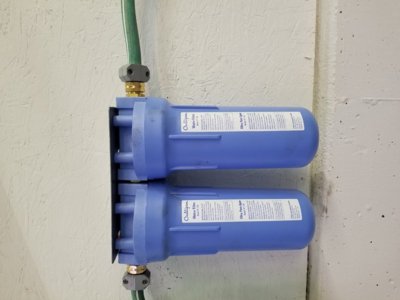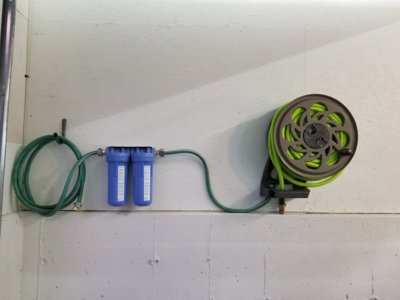So, those filters are not really going to prevent water spots.
The first filter is just a carbon filter. It will remove iron, color and smells/tastes, but will not remove any dissolved minerals that cause water spots.
The second filter is just a sediment filter. It will remove physical particles of stuff, like sand or silt, but any dissolved minerals will go right through it.
Now, the third filter does soften the water, but it will not prevent water spots, it will only reduce their severity. This filter exchanges "hard" dissolved minerals (like calcium and magnesium) for "soft" minerals, in this case sodium. Dissolved sodium will still leave water spots when the water drops dry, but this mineral is not as harmful to the clear coat, and will not etch it, but the spots will still be visible.
Since you have not been getting spots, my guess is that your water is not hard to begin with. I would suggest getting yourself a TDS meter and check your water. This meter measures Total Dissolved Solids, but does not distinguished between hard or soft minerals.
https://www.amazon.com/dp/B000VTQM70/?tag=fordraptorforum-20
With this meter, I tested my raw water at about 140ppm, and at this level, water spots do occur. I will also point out that after the raw water goes through the water softener in my house, the TDS is still 140ppm, since all that happens is the hard minerals are exchanged one-to-one with sodium.
The CR Spotless is a deionizing filter (DI water), which means that it removes all of the dissolve minerals, hard and soft. It does this by using a resin which attracts both positively and negatively charge ions. This type of resin media eventually gets used up when the dissolved minerals "use up" all the charge spots to stick to.
Also mentioned above is the reverse osmosis filter. This type of filter uses a membrane which acts kinda like a sieve, in that it has microscopic holes in it that allow water molecules to pass through, but not dissolved minerals, which are larger molecules. This type of membrane filter also gets exhausted, when it gets plugged up. This RO filter also uses a lot of "waste water" which passes over the membrane to flush off the minerals that don't go through. There is often 3-4 gallons of waste water that go down the drain for every gallon of RO water that ends up in the container. This can get expensive too, just like replacing DI resin.



